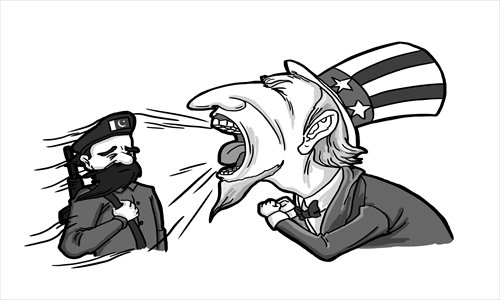Militants pose corrosive threat across Afghan border

"Good fences make good neighbors" is a principle that has been honored mainly in the breach along the Durand Line, the historic border between Pakistan and Afghanistan. Pakistan, Afghanistan, and the US are finding out that ill-defined, poorly protected borders can be problematic for both sides.
Historically, insurgents have often used porous borders to protect themselves from better armed, better equipped regular armies.
Since the US-led invasion of Afghanistan in 2001, Taliban militants have operated on both sides of the border, using Pakistan as a base for rest, recruitment, and planning. The Americans have complained bitterly about Pakistani harboring of insurgents, especially the Haqqani network, which has long been considered "irreconcilable" by the US.
The Haqqani network has carried out many high-profile attacks in Afghanistan, including the September 2011 bombing of the Indian embassy in Kabul. The Haqqani network has long standing ties to the Afghan Taliban, the Pakistani Taliban, and Pakistani intelligence agencies, which have used the Haqqanis to influence the course of events in Afghanistan.
Pakistan has had little interest in cracking down on cross border movement, not least because the Afghan Taliban remains popular in Pakistan. Pakistan also depends on radical jihadist groups to carry out its irregular war against India in Kashmir.
Pakistan has been notably less tolerant of the Pakistani Taliban, a collection of jihadist groups seeking the overthrow of the Islamabad government.
These militants have launched a wide set of attacks within Pakistan, including a May 2011 attack against an naval base that endangered numerous Chinese and US citizens.
However, in the past weeks, Pakistan has begun to complain that elements of the Pakistani Taliban, a collection of groups associated with but separate from the Afghan Taliban, has launched rocket attacks from Afghanistan into Pakistan.
As US forces withdraw, militants take advantage of the open border to seek refuge from the Pakistani army, which has steadily increased its pressure against the Pakistani Taliban.
In a turnabout, Pakistani officials are now accusing the US and Afghanistan of paying insufficient attention to the border. Americans accustomed to dealing with the Haqqani network have been less than amused by this turn of events.
The broader problem is that sponsorship of militant networks can have wide-ranging, unpredictable outcomes. Elements of the US supported mujahedeen eventually came to constitute part of the Taliban, giving harbor to enemies of the US.
Pakistani support of the Taliban as well as other militant networks has led to many terrorist attacks in Pakistan and India. In the future, jihadist networks may undertake major attacks in Xinjiang and other parts of China.
Whether or not elements of the Pakistani Taliban are using Afghanistan as a safe haven, border conflicts will continue to create problems between Pakistan, Afghanistan, and the US.
Afghanistan has neither the interest nor the capacity to spend much time worrying about Pakistan's problems.
The US needs both Pakistani and Afghan cooperation, but cannot control the border on its own. The use and tolerance of non-state militant networks exacerbates the problem, effectively making monsters that quickly escape the control of their creators.
This is especially true when the militant networks situate themselves in nearly ungovernable spaces.
Sensible statesmanship in the region should take a long view of national interests, and appreciate the dangers of militant non-governmental organizations.
Heavily armed bands of young, enthusiastic men undercut state power and authority, however attractive such networks may appear in the short term. Pakistan, Afghanistan, and India should take note, just as China and the US should closely monitor the development of new militant groups along the Durand Line.
The author is assistant professor of national security at Patterson School of Diplomacy and International Commerce, University of Kentucky. opinion@globaltimes.com.cn
US criticism only rubs salt in Pakistan's wounds